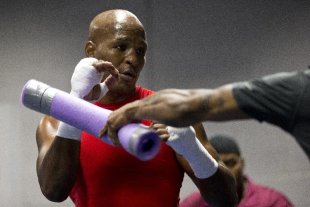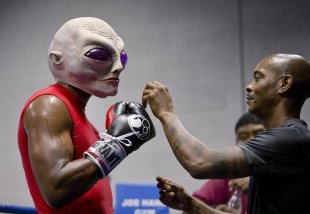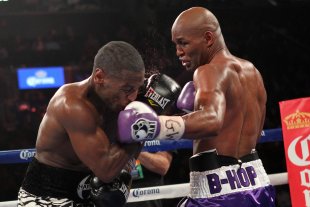He's less than two months shy of his 49th birthday, and is one of the most unlikely success stories in boxing history.
His is not just the story of a guy from the wrong side of the tracks who somehow managed to succeed. This is the story of a guy who completely changed his life, and who appeared to know in advance how the script would play out.
On the wall in his office at his suburban Philadelphia home is that framed photo of him and his managers, as well as many trinkets from his life. He carries a picture of his prison ID card – he was inmate number Y4145, serving a sentence at the State Correctional Institution at Graterford – as the screen saver on his mobile phone.
It's one of the many details from his life that Hopkins clipped and preserved. He's created a virtual Hall of Fame dedicated to his life.
He saved everything, he said, because he knew. He knew that despite the massive odds stacked against him, he'd somehow, some way, be a success.
"Come in my house and look around and you'll see so much stuff you'll say, 'What were you planning when you cut all this stuff up and kept all these audios, these interviews from big to small, like, what were you thinking?' " he said. "You know what? I was thinking I'd be where I'm at. I kept 90 percent of everything, including my ID card that is on the screen saver of my phone. Who does that? I'll tell you: The person who does that knows what is going to happen and where he is going to go, and he wants to save a record to document where he's been."
Sean Cosgrove was fresh out of Springfield (Mass.) College in 1981 when he took a job as a counselor/teacher at Glen Mills (Pa.) School about 20 miles from Philadelphia. Glen Mills is essentially a reform school for youth sent by a judge.
Shortly after Cosgrove was hired at Glen Mills, a skinny 15-year-old from Philadelphia showed up. There was something unique about the kid, Cosgrove said. He carried himself differently than most of his peers. Cosgrove had no idea what the young man had done to get himself assigned to Glen Mills, nor did he care. His job was to try to help him straighten his life, and to avoid the streets in Philadelphia, where trouble lurked everywhere.
Cosgrove knew then, even as a fresh and eager college graduate, the odds were working against this confident, respectful young man he'd met. He was impressed with what he saw of the kid, but Cosgrove was no fool. The streets had swallowed so many promising kids just like him.
"Back then at that time, there were so many failures that you couldn't really say he'd [do well]," Cosgrove said. "If you'd have asked me back then, I'd have said, 'Wow, he'll be lucky to get out and make 21.' It was nothing I saw in him or his personality; it was because I understood the real, cold world of Philadelphia's mean streets.
"Things were a little different back then. We talk to our kids now about getting their high school diplomas, about getting a GED, about going to college. Back then, it was, 'Let's get you through the next eight, nine months here and then go back to Philly and not kill anybody and not get involved in something that is going to put you away for a while.' "
"There was no quit in him," Cosgrove said. "He didn't say, 'You know, Big Sean, I don't want to do this anymore. This is too rough.' He just willed himself through."
Cosgrove lost track of the young man and never gave him a second thought, until one day, he saw a boxing match on television. He realized that the man he saw in the ring was the same skinny teen-ager he had worked with at Glen Mills.
"When I saw him, it brought back a lot of memories," Cosgrove said. "Bernard was a skinny kid with a big neck and he carried himself differently than the other kids. He was pretty serious and focused, but he was quick with a smile, too.
"There were so many gangs in Philadelphia. You have the JBM, which was the Junior Black Mafia. There was the Woodland Avenue Boys, the Moon Gang, so many of them. But Bernard was more of a strong, isolated guy and he wasn't down with any of them."
Hopkins was paroled from Graterford in 1988 after serving time on a strong-arm robbery conviction. When he was leaving, the warden made a point to speak to him.
He told Hopkins he would see him again upon his return to which Hopkins famously answered, "I ain't never coming back here."
And, he has not. He went on to become one of the great middleweight champions in boxing history, defending the title successfully an astonishing 20 consecutive times.
He upset Felix Trinidad in 2001 when he was 36 and perceived to be at the end of the line. He moved up two weight divisions and battered Antonio Tarver in 2006, when he was more than a year past his 40th birthday after promising his mother he'd retire by 40.
In 2011, he became at 46 the oldest man to ever win the world title, then topped that feat in March when he defeated Tavoris Cloud two months after his 48th birthday to claim the IBF light heavyweight belt.
He receives numerous offers to write a book on his life. Film producers have talked to him about a movie. He's not ready yet, though. The story, he says, is not over.
He's rich beyond compare and says, "Maybe I am on paper one of the one-percenters, but I don't think that way."
His is the story of a guy who came from unimaginable poverty, crime and dire circumstances to transform himself into a well-to-do man.
He's almost 49, but he's kept his body in such magnificent condition that he spends a half-hour talking about returning to middleweight for the first time since 2005 to fight the great Floyd Mayweather Jr.
He doesn't brag about his cars or his homes or his investments – "I know that's what they do today, but that's not how I do things," he says – and still feels a kinship with those who live on the edge, who survive day-to-day.
" … I'm around the one-percenters all the time, but I don't think the way they think. I think like a Republican and a Democrat depending on what the topic is. If you're capable, you should be able to earn and you should be able to provide and you should be able to use your labor to get the things you want for yourself and your family. But if you need help, if you need a push, if you need motivation, if you need inspiration, that's who I represent. I represent the common sense party."
His goal in 1988 was to stay out of jail. He knew how difficult that would be, but he said he knew he would be able to do it.
He had the vision even as a 23-year-old parolee that his life could lead to greatness, to an impossibly happy ending.
He just knew he wouldn't become another statistic, shot dead on the wrong end of a drug deal or put behind bars for the rest of his life because he committed a senseless crime.
"If someone wants to make a movie about my life, I'm not upset about that," he said. "But you have to realize that there is much more to come. There's a lot more to come. "Imagine if you had said to me in 2001 when I was getting ready to fight Trinidad and everyone was thinking that was it for me, 'OK, Bernard, this is it now. You can't be this guy anymore, and it's time to write that book and do that movie. It's been an incredible life and we need to document that.' Imagine if that happened? Can you believe what we would have missed from that movie?
"It's the same thing now. There is still a lot of history. My story is an inspirational story and a can-do story, but it's not over yet. It's not even close to being over yet. There's a lot of history to come."




No comments:
Post a Comment